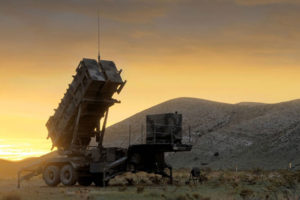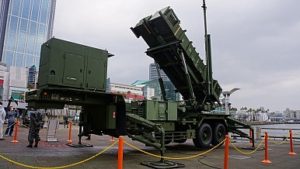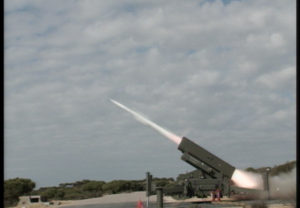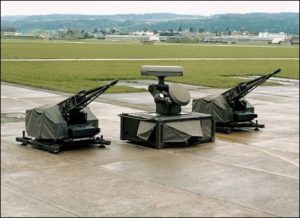Background
Kuwait is an Arab country in the Persian Gulf bordering Iraq and Saudi Arabia. Kuwait has a strategic partnership with the US and has received military and defense technical assistance and is an important ally in the US’ fight against international terrorism.
Kuwait Ballistic Missile Defense Capabilities
| System | Operator | Number Deployed | Platform | |
| Patriot/PAC-3 | Kuwait | Unknown | Ground-based/ mobile |  |
Kuwait Air Defense Capabilities
| System | Role | Number Deployed | Platform | |
| MIM-104 Patriot/PAC-2 | Medium- to Long-Range Air Defense | Unknown | Ground-Based; Road-Mobile |  |
| Spada 2000 | Medium-Range Air Defense | Unknown | Ground-Based |  |
| MIM-23 Hawk | Medium-Range Air Defense | Unknown | Ground-Based |  |
| Skyshield 35 | Short-Range Air Defense | Unknown | Ground-Based; can be Road-Mobile |  |
Kuwait is equipped with land based PAC-2 & PAC-3 Patriot missiles. In 2009 and 2012 Kuwait successfully executed two live fire patriot tests on its own soil.[i] Kuwait also has the Spada 2000 which is an improved variant of Skyguard ground based air defense system. Kuwait has followed up with requests for two more patriot batteries and 100 missiles signally its recognition of the growing threat from Iran.
As a member of the Gulf Cooperation Council, which has been tasked with forming a regional ballistic missile defense shield, Kuwait is working with Bahrain, Oman, Qatar, Saudi Arabia, and the United Arab Emirates to achieve this goal. In 2007, Kuwait negotiated a key FMS case with a $148 million contract to upgrade its six Patriot radars to the Configuration-3 version.
In 2016, Raytheon won a $523.4 million contract to upgrade Kuwait’s Patriot missile defense systems. New additions include the modern adjunct processor, digital radar, and upgraded software. Work on the contract is scheduled to be completed by December 2018.[ii]
Current Developments
In September 2018, the United States Defense Department announced it would be removing two Patriot batteries from Kuwait. There have been no plans to replace the systems since their removal.
The U.S. State Department approved the possible sale of 60 AIM-120C-7 Advanced Medium Range Air-to-Air Missile (AMRAAM) to Kuwait at an estimated price of $110 million. The AIM-120C-7’s are expected to be equipped to the F/A-18 aircraft, improving Kuwait’s interoperability with the U.S. and their overall air-to-air capability. The AMRAAM family of missiles is capable of intercepting multiple aerial threats including cruise missiles, and could be equipped to the National Advanced Surface-to-Air Missile System (NASAMS) if Kuwait was to move to purchase the missile defense system.
In May 2020, Kuwait and the United States agreed upon three package deals in order to upgrade Kuwait’s defense systems, amounting to over $14 billion in total. These packages include a number of repair and maintenance costs, as well as the purchase of PAC-3 enhancements. In September 2023, Kuwait proposed a 30 year extension in operations of Patriot PAC-3 systems, for a proposed cost of $150 million.
In October 2022, the United States and Kuwait announced an agreement to purchase $3 billion in NASAMs systems manufactured in a joint partnership between Raytheon and Kongsberg.
Recent News
References
[i] https://www.shephardmedia.com/news/landwarfareintl/kuwait-air-defence-forces-conduct-succes/
[ii] https://www.bizjournals.com/washington/blog/fedbiz_daily/2016/06/raytheon-wins-523-4-million-contract-to-upgrade.html
